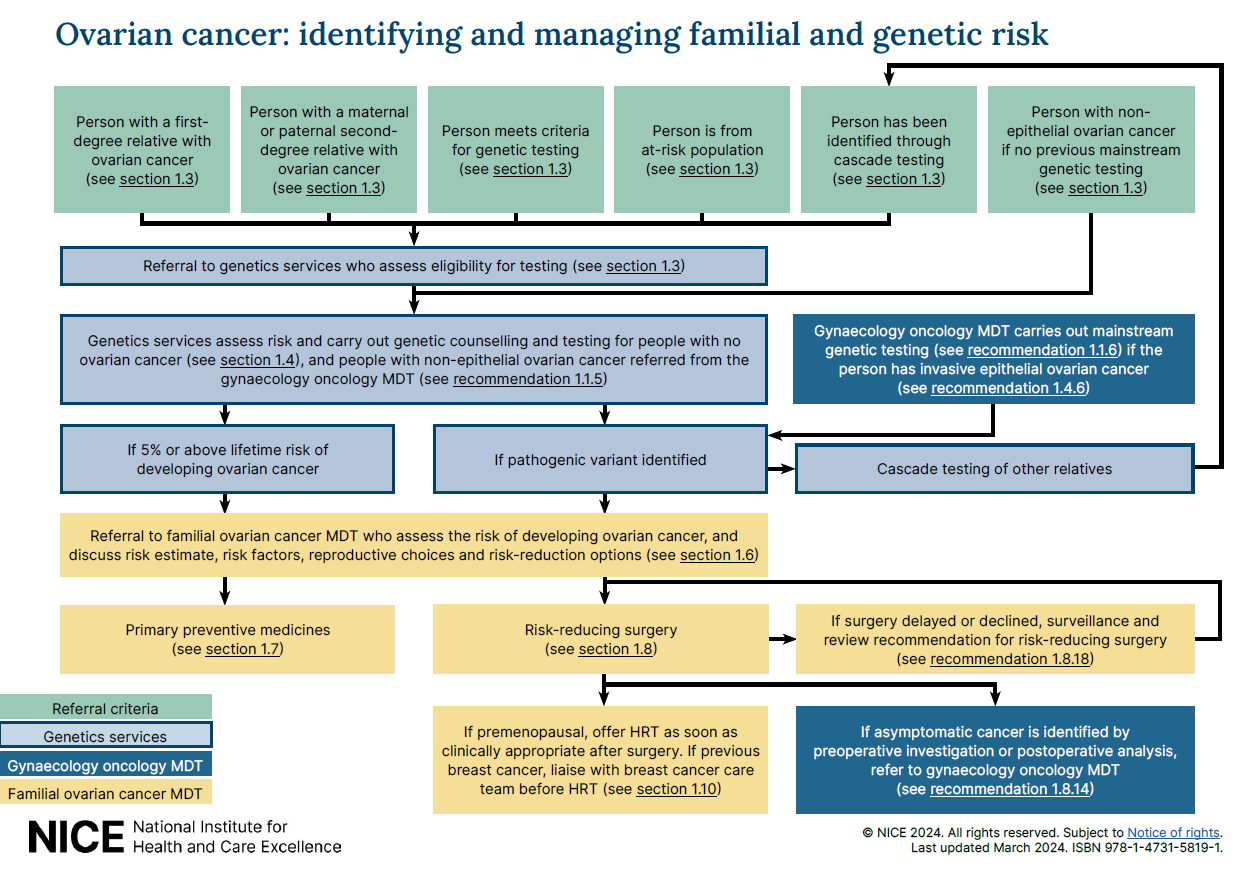Overview
This guideline covers assessing the familial and genetic risk of having a pathogenic variant associated with ovarian cancer in adults.
In women, trans men and non-binary people with female reproductive organs (ovaries, fallopian tubes and/or a uterus), having a pathogenic variant increases the risk of developing ovarian cancer (familial ovarian cancer). As well as risk assessment, this guideline covers risk management and decision-making support for people born with female reproductive organs who have, or are at risk of having, a pathogenic variant associated with ovarian cancer.
Men, trans women and non-binary people born with male reproductive organs cannot develop ovarian cancer, but if they have a pathogenic variant associated with ovarian cancer, they can pass the variant on to their children, and may be at risk of developing other cancers. This guideline covers risk assessment, but it does not cover managing risk or decision-making support for people born with male reproductive organs.
NICE has also produced a guideline on the recognition and initial management of ovarian cancer.
Last reviewed: 21 March 2024
Next review: This guideline will be reviewed if there is new evidence that is likely to change the recommendations.
How we prioritise updating our guidance
Decisions about updating our guidance are made by NICE’s prioritisation board. For more information on the principles and process, see NICE-wide topic prioritisation: the manual.
For information about individual topics, including any decisions affecting this guideline, see the summary table of prioritisation board decisions.
Recommendations
This guideline includes recommendations on:
- organisation of services
- information and support
- assessing the risk of having a pathogenic variant
- criteria for genetic counselling and genetic testing
- assessing the risk of developing ovarian cancer
- primary preventive medicines
- risk-reducing surgery
See the 1-page visual summary on identifying and managing familial and genetic risk in ovarian cancer.
Who is it for?
- Healthcare professionals working in primary, secondary and tertiary care
- Cancer alliances
- Commissioners (including clinical commissioning groups and NHS England specialised commissioning)
- Voluntary sector organisations
- Adults (18 years and older) with a genetic risk of having a pathogenic variant associated with ovarian cancer, and their families and carers (where appropriate)
Guideline development process
How we develop NICE guidelines
Your responsibility
The recommendations in this guideline represent the view of NICE, arrived at after careful consideration of the evidence available. When exercising their judgement, professionals and practitioners are expected to take this guideline fully into account, alongside the individual needs, preferences and values of their patients or the people using their service. It is not mandatory to apply the recommendations, and the guideline does not override the responsibility to make decisions appropriate to the circumstances of the individual, in consultation with them and their families and carers or guardian.
All problems (adverse events) related to a medicine or medical device used for treatment or in a procedure should be reported to the Medicines and Healthcare products Regulatory Agency using the Yellow Card Scheme.
Local commissioners and providers of healthcare have a responsibility to enable the guideline to be applied when individual professionals and people using services wish to use it. They should do so in the context of local and national priorities for funding and developing services, and in light of their duties to have due regard to the need to eliminate unlawful discrimination, to advance equality of opportunity and to reduce health inequalities. Nothing in this guideline should be interpreted in a way that would be inconsistent with complying with those duties.
Commissioners and providers have a responsibility to promote an environmentally sustainable health and care system and should assess and reduce the environmental impact of implementing NICE recommendations wherever possible.
